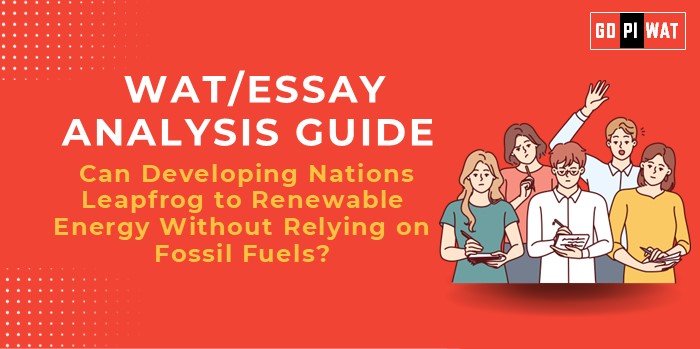📋 Written Ability Test (WAT)/Essay Analysis Guide: Can Developing Nations Leapfrog to Renewable Energy Without Relying on Fossil Fuels?
🌍 Understanding the Topic’s Importance
Renewable energy is at the core of sustainable development, but the feasibility of bypassing fossil fuels poses a critical challenge for policymakers in developing nations. This essay highlights the interplay of technology, economics, and global commitments.
📝 Effective Planning and Writing
- Time Allocation (30 minutes):
- Planning: 5 minutes
- Writing: 20 minutes
- Review: 5 minutes
📚 Structuring the Essay
💡 Introduction Techniques
- Contrast Approach:
“While solar power offers an affordable energy source, reliance on coal still powers the economic engines of many developing nations.” - Solution-Based Approach:
“By embracing decentralized solar and wind technologies, developing nations can leapfrog fossil fuels without sacrificing growth.”
📖 Body Paragraphs
- Achievements:
- Highlight advancements like falling costs of renewables, policy successes, and case studies (e.g., Morocco’s Noor Project).
- Challenges:
- Discuss technological gaps, financing issues, and the role of transitional energy sources like natural gas.
- Future Outlook:
- Propose hybrid energy models and international funding mechanisms for sustainable energy transitions.
✅ Conclusion Templates
- Balanced Approach:
“While leapfrogging to renewables is ideal, a phased approach with clean transitional fuels may be pragmatic.” - Global Comparison:
“By learning from global leaders like Costa Rica and tailoring solutions to local contexts, developing nations can achieve sustainable growth.”
🌟 Recommendations for Sustainable Progress
- Invest in decentralized renewable systems.
- Strengthen international collaboration for technology and finance.
- Encourage public-private partnerships in green energy projects.
✍️ Sample Short Essays
1. Balanced Perspective:
“Developing nations face a dual challenge of expanding energy access and reducing emissions. Renewable technologies offer hope, but transitional reliance on cleaner fossil fuels might be unavoidable to ensure economic growth.”
2. Solution-Oriented:
“Renewable energy adoption, supported by global funding and innovations like microgrids, can enable developing nations to bypass fossil fuels and ensure sustainable development.”
3. Global Comparison:
“Costa Rica’s success in renewable energy demonstrates that ambitious policies and investments can achieve energy independence without reliance on fossil fuels.”


